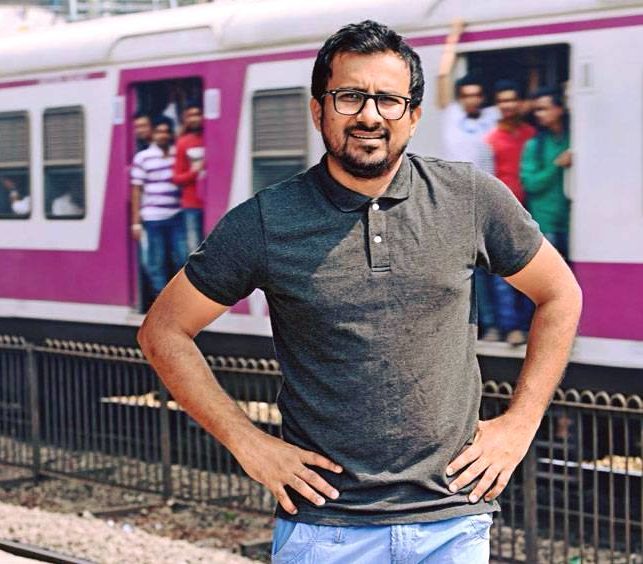Dipesh Tank wears spycam shades to record crimes against women, but he is upset the system isn’t changing
While travelling in the local trains of Mumbai, you may have come across a man in fashionable shades. Was he a cop waiting to catch an underworld don? Too dramatic? Perhaps. Was he then aspiring to be a movie star just flaunting his dude quotient? In the rush work hour, there was no time to think about these possibilities. You didn’t know it then, that it was Dipesh Tank, who was there recording male passengers harassing the women in local trains. His sunglasses are fitted with spy camera – and Dipesh secretly records men harassing female passengers and submits them to the police.
But after several years of handing over these videos to the authorities, Dipesh doesn’t quite know who would carry on with this work on a regular basis. Come to think of it, he was doing the job of the police. And after five years since he started this initiative, now that he travels less on trains after taking up a new job recently, he is no longer able to devote as much time to this work.
Over 80 lakh commuters take the local trains in Mumbai everyday – a large part of this is women – and he was shocked and upset about the horrors his fellow women passengers faced. Men made catcalls, whistled, touched women inappropriately. This happened every single day without exception, and Dipesh decided he couldn’t take it any longer.
The thought of initiating the campaign first occurred to him after the disturbing gangrape of a woman in New Delhi on the night of December 16, 2012 – the Nirbhaya rape case. “The thought came to me after the Nirbhaya incident. I watched some boys harassing some women. I protested and tried to catch them, but I couldn’t.” So in early 2013, Tank and eight of his friends decided to start the campaign “War Against Railway Rowdies” (WARR).
He took a survey among women to find out how safe women feel in trains or at stations. Most of the women who responded said that they felt unsafe. “I approached the railway authorities with the findings. But the response was lukewarm,” Dipesh said.
But it didn’t stop him. He started recording the harassment of women on his phone and camera and took them to the police. After six months of effort, the authorities responded. Eventually, WARR conducted a drive along with the police and several persons harassing women were rounded up.
Since then, he has been regularly sending his recordings to the Government Railway Police (GRP) for the latter to take action. He continues to record and submit videos or calls the police helpline to report the location where the incident took place.
“But the earlier method of recording it on phone and cameras was very risky. Most of the time I used to dangle out of the doors of moving trains while recording. I didn’t want to die like that,” Dipesh said. Then he looked up the internet for caps with hidden cameras. But caps could fly away or fall off in crowded trains. A pair of sunglasses was the best option, and he bought a pair of glares with spycam for Rs 25,000 from a US based company.
This seems like an exciting project that could put an end to harassment of women at least in the local trains of Mumbai. But there are loopholes in the law. In crimes relating to women, the person harassed must be present for the case to move to its logical conclusion – punishment for the harasser. But most of the time in the moving train, by the time Dipesh returned to the platform after recording, the women would have left already. “So the persons caught were mostly booked under Section 110 of the Bombay Police Act 1951.” And they got away easily because it is a bailable offence.
Tank now has a demanding job in a non-profit organisation that works on anti-trafficking. “I still travel by train, though not every day. I continue to record these episodes on trains with the spy camera. But one NGO or a few individuals can’t change the entire system. It’s not my job alone. It is as much your job who is writing this story as it is mine.”
There were many phone calls, appreciation messages and people wanting to do this in other parts of the country. Tank has responded enthusiastically each time. “It’s great if others can do it elsewhere. But I think the authorities should do more, and people must themselves stop these shameful acts. We are thinking of bullet trains and making other ambitious plans, but women feel unsafe in public modes of transport.”
Crime against women has gone up by 40% between 2012 and 2016, as figures (pdf file) National Crime Records Bureau indicates. Women face routine ordeals in public transport as cases of harassment are reported in every part of the country. Under such a backdrop, Dipesh Tank’s efforts and the success is laudable, but as he himself says, it can’t make much of a difference in the long run. “It’s the job of the authorities and of every individual to stop crime against women and to make public spaces safe for everyone.”
Watch a video recorded by Dipesh Tank:

